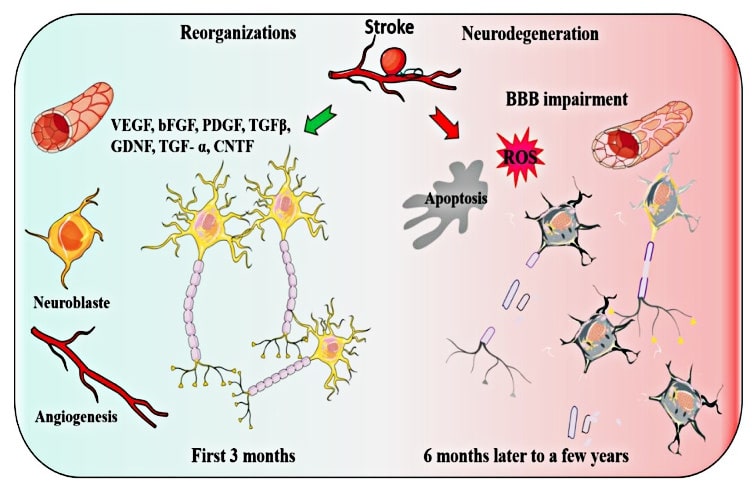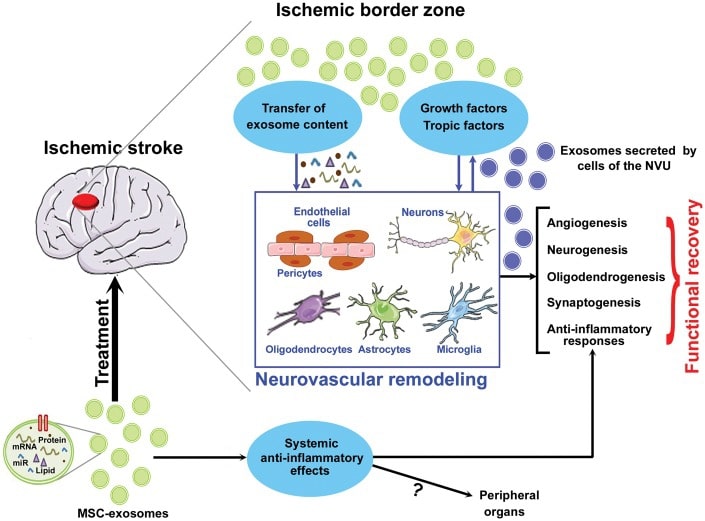Therapeutic Exosomes for Stroke
As a non-cellular therapeutic strategy, exosome-based stroke therapy has the unique advantage of low immunogenicity and offers new ideas for drug development in brain diseases. Creative Biolabs can provide research services for the application of exosomes in stroke therapy to help our clients with research and drug development for brain diseases such as stroke.
Pathogenesis of Stroke
Stroke is an acute brain tissue injury disease caused by a sudden rupture or blockage of a blood vessel in the brain that progresses rapidly and has serious consequences. Stroke can lead to limb paralysis, depression, difficulty swallowing and other hazards, leaving patients with functional impairments such as speech and cognition. High systolic blood pressure, high body mass index, high fasting glucose, environmental particulate matter pollution and smoking are the five major risk factors for stroke, which are also common in other major non-communicable diseases.
The pathophysiological mechanisms of stroke are related to events such as peri-infarct depolarization, blood-brain barrier damage, neurotoxicity of excitatory amino acids, oxidative stress, and inflammatory damage, which together trigger brain cell death and dysfunction through interconnection and coordination. The degree of stroke deterioration depends not only on the degree of brain tissue damage, but is also influenced by the ability of brain nerves and blood vessels to repair themselves. Thus, clinical reports of stroke patients commonly report dysfunctional regulation by miRNAs of genes associated with the regulation of neuronal cell function, cerebral vascularity and neurogenesis. For example, a potential binding site for miR-210 exists in the 3'-UTR of the regulatory inhibitor of vascular regeneration gene Efna3 and the pro-apoptotic gene Ptp1b, and miR-210 deletion can be detected from the blood of stroke patients, which induces a significant decrease in the levels of angiogenic factors IL-1α and TNF-α, triggering apoptotic protease activity and apoptotic brain cell damage.
 Fig.1 Two events may occur after a stroke, reorganization or neurodegeneration. (Azizi, 2020)
Fig.1 Two events may occur after a stroke, reorganization or neurodegeneration. (Azizi, 2020)
Therapeutic Exosomes for Stroke
The essence of stroke treatment is the restoration of highly interactive functions of brain cells such as epithelial cells, neurons and glial cells, for example, neurogenesis, neuronal and synaptic plasticity, synapses and cerebral vasculature formation. Given the advantage of being able to cross the blood-brain barrier and deliver information from both source and target cells, exosomes have great potential for use in clinical studies of stroke. Numerous preclinical studies have demonstrated the restorative effects of exosomes on the damaged central nervous system. Astrocytes separate neurons in brain regions and support compartments to avoid disruption of impulses between neurons and their synapses, and their derived exosomes play an important mediating role. It was found that astrocyte-derived exosomes can induce anti-inflammatory and anti-apoptotic effects in neurons, thus protecting them from disease attacks on brain tissue. At the same time, these neurons can produce prolonged enhancement responses that facilitate synaptogenesis and remodeling, exhibiting significant neuroprotection. In addition, M2-type microglia-derived exosomes were able to increase neuronal levels of ceramide and sphingomyelin, enhancing synaptic transmission and neurovascular repair.
In addition to the neuroprosthetic role of endogenous exosomes in stroke, exogenous exosomes can also delay the progression of stroke by modulating cellular crosstalk. For example, endothelial progenitor cell (EPC)-derived exosomes can rescue stroke-induced endothelial cell apoptosis in vitro, which may be attributed to their delivery of miRNAs such as miR-210 and miR-126 that promote vascular/neural regeneration and anti-apoptotic effects. Adipose MSC-derived exosomes promote angiogenesis by reducing the infiltration of CD11+ and CD68+ cells, while their enriched miR-30D-5p attenuates brain injury by interfering with autophagy-mediated polarization of microglia to M1 type. In addition, MSC-derived exosomes were also shown to balance oxidative stress in brain vasculature and stabilize the blood-brain barrier by enhancing tight junction protein expression, thereby inducing angiogenesis in rat brain cells and restoring normal neurological function.
 Fig.2 Summary of MSC-exosome-derived therapeutic effects after stroke. (Venkat, 2018)
Fig.2 Summary of MSC-exosome-derived therapeutic effects after stroke. (Venkat, 2018)
A large amount of preclinical evidence has suggested that exosomes have important implications and therapeutic potential in the exploration of stroke treatment strategies, while the mechanism of action, biodistribution and metabolism of therapeutic exosomes still need to be supported by more research data. Creative Biolabs has a proven technology platform and professional team for exosome extraction, characterization and functional studies, and is able to provide our clients with services for the development of stroke related therapeutic exosomes. Please contact us to meet your needs.
References
-
Azizi, F.; et al. Potential role of exosome in post-stroke reorganization and/or neurodegeneration. EXCLI J. 2020, 19: 1590-1606.
-
Venkat, P.; et al. Exosome-mediated amplification of endogenous brain repair mechanisms and brain and systemic organ interaction in modulating neurological outcome after stroke. J Cereb Blood Flow Metab. 2018, 38(12): 2165-2178.
For Research Use Only. Cannot be used by patients.
Related Services:

 Fig.1 Two events may occur after a stroke, reorganization or neurodegeneration. (Azizi, 2020)
Fig.1 Two events may occur after a stroke, reorganization or neurodegeneration. (Azizi, 2020)
 Fig.2 Summary of MSC-exosome-derived therapeutic effects after stroke. (Venkat, 2018)
Fig.2 Summary of MSC-exosome-derived therapeutic effects after stroke. (Venkat, 2018)









